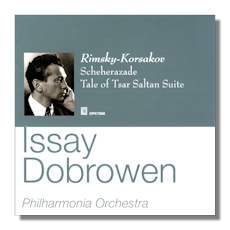
The Internet's Premier Classical Music Source
Related Links
- Rimsky-Korsakoff Reviews
- Latest Reviews
- More Reviews
-
By Composer
-
Collections
DVD & Blu-ray
Books
Concert Reviews
Articles/Interviews
Software
Audio
Search Amazon
Recommended Links
Site News
 CD Review
CD Review
Nikolai Rimsky-Korsakoff

- Schéhérazade, Op. 35
- Tale of Tsar Saltan, Op. 57
Philharmonia Orchestra/Issay Dobrowen
Opus Kura OPK7068
Easily the best part of this disc is hearing the Philharmonia Orchestra bring their signature soloists to the party for these chestnuts. Although in 1952 the orchestra was nowhere near their artistic apex, the appeal of these forces in this music is undeniable. For an English orchestra at this date, the Philharmonia sounds unusually good. Winds and strings are particularly outstanding, and although I'm less impressed by what sounds like a few brass flubs and restricted mono sound, these accounts are well worth hearing for the historical crowd.
You may have noticed that I haven't yet mentioned the conductor, fiery Issay Dobrowen. He was a talented man, but made few recordings and held few posts. Even in 1952 Dobrowen was considered inferior to the podium giants of his age, and he didn't do enough either live or in the studio to become his own "cult" figure. Being compared to Toscanini is unenviable, then or now, and Dobrowen simply lacked the star power – or the results to compete. He died in 1953, well before stereo sound might have made him a star. His recordings show an exciting and flexible musician, attuned to Romantic colors and moods (his lone appearance in an EMI/Warner series of note ironically shows him in Brahms). All this is a very long way of saying that the conducting here is fine, if somewhat lacking in true greatness.
But again, the playing is superlative, and Dobrowen has to get at least some credit for galvanizing his charges to play so well. These pieces ideally need stereo sound, or at least a presence who can transcend the limitations of monophonic technology. Here we have neither, but the results are still amazingly fine. The balances are genuinely good; the harp is audible and all the winds are spotlighted in a way that captures your imagination. Slow sections are full of character, the quicker sections need a bit more fuel. For that reason, the Tale of Tsar Saltan probably wins as far as the finer performance. The woodwinds outdo themselves and the suite is exciting and full of color throughout. The brass are sour, everyone else sounds world class. I can't stress enough how nice it is to hear this kind of strong playing (in both pieces) this soon after the war. And the conductor – in the Suite especially – paces well and makes you wish he had left us more to judge him by. I'm not sure who is in the market for these pieces in mono, but historical buffs will like this. A lot. Opus Kura provides notes in Japanese and terribly printed English, but the disc sounds great at least. Worth hearing.
Copyright © 2014, Brian Wigman












